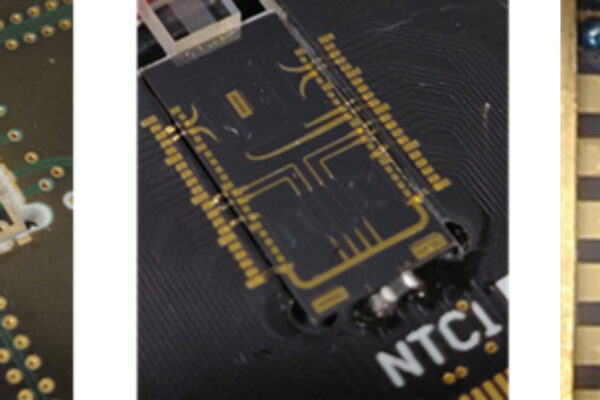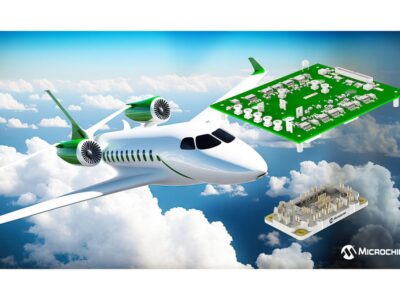
Photonic chips for QKD quantum security system
Toshiba Europe Ltd has developed what it claims is the world’s first quantum key distribution (QKD) system based on photonic chips.
The chips, based on standard semiconductor process technology, are the basis of mass production of quantum security technology, bringing its application to a much wider range of scenarios including the Internet of Things (IoT) says Toshiba.
Parts of the technology were developed as part of the AQuaSeC project in the UK along with BT, were Toshiba has key quantum network roll outs, and KETS Quantum Technology, a spin out of the University of Bristol that has also developed photonic quantum QKD chips.
The complete QKD prototype is the first with quantum photonic chips with different functionsRandom bits for preparing and measuring the qubits are produced in quantum random number generator (QRNG) chips and converted in real-time into high-speed modulation patterns for the chip-based QKD transmitter (QTx) and receiver (QRx) using field-programmable gate arrays (FPGAs).
Related articles
- World’s first quantum metro network in London
- Toshiba launches global Quantum Key Distribution business
- £3.1m for UK PCIe quantum security startup
- BT and Toshiba install UK’s first quantum-secure industrial network
“We are witnessing with photonic integrated circuits a similar revolution to that which occurred with electronic circuits. PICs are continuously serving more and more diverse applications,” said Taofiq Paraiso, lead author of the paper in Nature Photonics describing the chip-scale QKD system, Of course, the requirements for quantum PICs are more stringent than for conventional applications, but this work shows that a fully deployable chip-based QKD system is now attainable, marking the end of an important challenge for quantum technologies. This opens a wide-range of perspectives for the deployment of compact, plug-and-play quantum devices that will certainly strongly impact our society.”
Photons are detected using fast-gated single photon detectors. Sifting, photon statistics evaluation, time synchronisation and phase stabilisation are done via a 10 Gbit/s optical link between the FPGA cores, enabling autonomous operation over extended periods of time. As part of the demonstration, the chip QKD system was interfaced with a commercial encryptor, allowing secure data transfer with a bit rate up to 100 Gbit/s.
The QKD units are assembled in 1U rackmount cases. The QRx and QTx chips are packaged into C-form-factor-pluggable-2 (CFP2) modules to ensure forward compatibility of the system with successive QKD chip generations, making it easily upgradeable. Off-the-shelf 10 Gbit/s small-form-factor pluggable (SFP) modules are used for the public communication channels.
QKD addresses the demand for cryptography which will remain secure from attack by the quantum computers. The protocols used for quantum cryptography can be proven secure from first principles and will not be vulnerable to attack by a quantum computer, or indeed any computer in the future.
The QKD market is expected to grow to approximately $20bn worldwide in FY2035 and Toshiba has already established a business in Cambridge to make QKD systems based on discrete optical components. Large quantum-secured fibre networks are currently under construction in Europe and South-East Asia, and there are plans to launch satellites that can extend the networks to a global scale and Toshiba has implemented quantum-secured metro networks and long-distance fibre optic backbone links in the UK, Europe, US and Japan.
The quantum transmitter chips developed by Toshiba measure just 2x6mm, allowing several hundred chips to be produced simultaneously on a wafer.
“Photonic integration will allow us to manufacture quantum security devices in volume in a highly repeatable fashion. It will enable the production of quantum products in a smaller form factor, and subsequently allow the roll out of QKD into a larger fraction of the telecom and datacom network,” said Andrew Shields, Head of Quantum Technology at Toshiba Europe
Taro Shimada, Corporate Senior Vice President and Chief Digital Officer of Toshiba Corporation comments, “Toshiba has invested in quantum technology R&D in the UK for over two decades. This latest advancement is highly significant, as it will allow us to manufacture and deliver QKD in much larger quantities. It is an important milestone towards our vision of building a platform for quantum-safe communications based upon ubiquitous quantum security devices.”
Other related articles
- Toshiba pushes quantum communication over 600km
- Japan’s national quantum electronics push
- UK project to build quantum key distribution satellite
- World’s first trial of quantum security over hollow core fibre cable
Other articles on eeNews Europe
- Europe to extend investigation of Nvidia-ARM deal
- France in €6bn boost for semiconductors
- ARM launches virtual modelling toolchain to boost AIoT development
- Europe invests €227m directly in tech startups
- Power breakthrough for neuromorphic AI
- Nordic ports TinyML to cellular IoT chip
- 14,336 ARM cores in chiplet-based waferscale AI engine
 If you enjoyed this article, you will like the following ones: don't miss them by subscribing to :
eeNews on Google News
If you enjoyed this article, you will like the following ones: don't miss them by subscribing to :
eeNews on Google News


